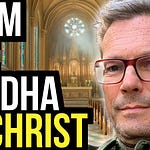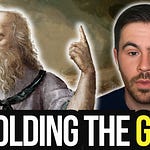(*Audio and written essay differ as had to make changes.)
In this essay, I will show how Plotinus’ philosophical system (Neoplatonism) provides the normative order for a meaningful worldview, based on John Vervaeke’s argument in Awakening From The Meaning Crisis. Firstly, we will introduce Plotinus and his ideas. Then we will show how he utilises Aristotelian science, Stoic Spiritual exercises, and finally, introduce several important enacted symbols to describe this spiritual journey to the One.
Plotinus; the Sage.
“Never stop sculpting your statue.”
Plotinus
Plotinus (born 204/5 - 270 AD) was a Platonic Philosopher, born Hellenized Egyptian, and the founder of Neoplatonism. Though he looked at himself as a platonist, he formalised a lot of work that came before and synthesised the best of ancient philosophy. When Plotinus started to learn philosophy at age twenty-eight, the Roman Empire was falling into the crisis of the third century and in the death throes of its final collapse. The perception of a rising, dramatic paradigm shift must have coloured this time, similar to ours, but Plotinus was unconcerned about politics and turned his attention to the infinite, the one, which we met in the essay on Plato as the Good.
Plotinus, like Plato, looked at philosophy not as an academic subject but as a ‘conversion of attention’ to ‘see as we ought to see’; a philosophical way of life. The philosopher was more of a spiritual adviser who sought to mould his students to engage with the spiritual life, which is ‘the deepest levels of the self’, through spiritual exercises. Plotinus wanted to deter his students from concerns of the flesh like food, sex, and status, to become conscious of their spiritual lives again and to reorient their attention to the highest good. His yoga of attention offered to re-built a connection to the deepest levels of the self for the initiate, as Plotinus writes:
“To find God, it is not necessary to go to the temples he is supposed to inhabit. We do not have to budge to attain his presence. Rather, we must ourselves become a living temple.”
His yoga of attention aims at becoming a living temple, becoming godlike in that sense of being identified with the divine rather than earthly concerns. This reunion with the one is achieved through spiritual exercises and moral purifications as a way of life. Like most ancient philosophers, Plotinus believed we have everything we need to be happy within our minds and need nothing external to us. His philosophy, a grand spiritual journey, a heroic ascendance and return from the one, guided this continuous self-transformation in a bid to ‘turn the soul to the Good’. As his last words instructed,
“Try to raise the divine in yourselves to the divine in the all.”
The Levels of The Self.
“Withdraw into yourself and look. And if you do not find yourself beautiful yet, act as does the creator of a statue that is to be made beautiful: he cuts away here, he smoothes there, he makes this line lighter, this other purer, until a lovely face has grown upon his work. So do you also: cut away all that is excessive, straighten all that is crooked, bring light to all that is overcast, labour to make all one glow of beauty and never cease chiselling your statue, until there shall shine out on you from it the godlike splendour of virtue, until you shall see the perfect goodness surely established in the stainless shrine.” ― Plotinus
It is necessary to say something about Plotinian metaphysics to situate his ethics. However, we won’t dwell too long for fear of getting stuck in the philosophical weeds. In the Aristotle essay, we discussed how Aristotle set up a ‘chain of being’ and how his science set up levels of being from pure potential to what was most actual. In this chain of being, living things like plants occupy one level, animals with minds another and rational beings like humans in the top spot. For Plotinus, these were all levels of the self and not separable from reality, in Neoplatonism ontology and psyche are unified. These levels of the self are not separable from reality; therefore, as we progress to the deepest levels of the self, we encounter true reality, which Plotinus calls The One. The true, the Good and The Beautiful point to God’s nature, the nature of ultimate reality.
This chain of being culminating in the One, shows how we organise the psyche upwards from pure potential to actualisation. Plotinus saw what was at the bottom, pure potential, formless chaos, as the source of evil in the world, and this he called matter, which is quite different to how we use the term today. Evil in this sense has no reality, being formlessness but is parasitic on the good. So evil is more like entropy - important to remember everything we call a thing has a form, a structural functional organisation that makes it intelligible as ‘one’ thing. The world of forms is the stock of real and intelligible patterns in the world.
Plotinus argued that if we cast our minds to higher and higher forms, we could become more integrated and complex creatures. He saw things as becoming more real as we integrate them together because they come closer to being ‘one’. Therefore by casting our minds to the highest form, we can become the best version of ourselves, a good person, which is the same as an actualised person for Plotinus, who is most like ‘the one’. (This idea of becoming ‘the one’ was the dramatic inspiration for the Matrix with Neo, which references Neoplatonism).
How does this all look in practicality?
Veraveke points out that Plato has these levels of the self in his work which we already discussed. The first level was a monster (he used the example of Cerberus, the three-headed dog, or a chimaera, which crosses multiple categories), this a biological, appetitive self, obsessed with short-term salience. The second of the self was a lion, a social status-seeking, honour-driven self, what Martin Luther King described as ‘the drum-major instinct’, a desire for greatness and social status and avoiding shame and guilt that all human beings have. The third was a human being, capable of long-term goal setting, reasoning, and caring about truth and false, but motivationally weak compared to the others.
Veraveke argues all these three levels of the self are in conflict because they all trade off with one another - have goals across different timelines. This inner conflict causes divided attention. For example - the monster wants cake? The lion wants to look good at the beach? And the human being wants to live a long and healthy life? The lion and the human being don’t have the same aim, so the monster wins, and you eat the cake. However, if you might join a group to lose weight, and the man and lion can team up and can now defeat the monster. Hence when the parts of the self are co-ordinated, salience becomes regulated toward long-term goals, and attention can be sustained and also flow attained, which we discussed in the last essay on Stoicism and inner peace.
The mission of Plotinian philosophy, like Plato, is to integrate these levels of the self, unifying short and long-term goals up the stack. This integration process occurs dramatically by pursuing the Good. This is self-realisation, which verveake argues this is how you make the self real. Interestingly, this ancient conception of self-realisation aligns with the latest arguments on the autonomy of attention, and James Williams makes almost the exact argument on goals and integrating goals in his 2017 PhD thesis. Williams writes:
As the criterion that attentional mechanisms use to prioritize information, goal-relevance is important for many existing conceptions of autonomy. Austin & Vancouver (1996) define a goal as ‘the internal representation of a desired state.’ A substantial literature on the psychology of human goals exists, and the topic is an area of active research (Locke & Latham 2002). Of immediate importance, however, is research on the psychology of goals that has shown that they exist in a hierarchical network structure. In such a structure, immediate goals (i.e. tasks) inhabit the lowest level of the hierarchy and the goals that they serve inhabit higher levels… (he goes on to write)…
In fact, I believe the concept of a ‘goal’ is elastic enough to have even wider applicability. I suggest that it could be extended to include, on one hand, actions to which our irrational, impulsive, System 1 selves are attracted (e.g. the ‘goals’ of your biological self) , as well as, at the other extreme, our highest-level metacognitive goals (i.e. goals about goals), which correspond to Frankfurt’s ‘second-order’ desires.
In this sense, autonomy, human freedom, comes from integrating these goal systems towards a higher-order goal. The applications of this kind of thinking are revolutionary but what I will focus on is that the integration of the self is the integration of competing goals across different time scales, long-run and short-run and that this is fundamentally worked out through attention, which is influenced by both unconscious short term salience and long term goal-directed prioritisation in a dynamical self-organising, opponent processing, manner.
Grace, Virtue & Self-integration.
In the first essay, we discussed Greek accounts of self-control: Enkrateia and Sophrosyne. The former is a white-knuckle inhibitory ‘don’t eat the cake’ type of self-control, and the latter is more like right-desire, being oriented to and tempted by the right things. In the last essay, we looked at the Stoic account of disciplining desire, which is what Plotinus recommends also, but that the enkratic inhibitory self-control might only be an intermediary stage in cultivating a desire for the right things. This of course leads to the question, what are the right things? The right thing, or things, are the things that are most valuable, so we return to this problem of a hierarchy of values being necessary for self-integration.
This type of self-integration can be thought of as ‘philosophical grace’. Grace is a complex religious idea, but how I think about philosophical grace is essentially the same as St Augustine’s theory of desire. Augustine’s theory of desire is that we are faced with too many choices between goods as human beings, sex is good, food is good, the internet is good, but if one of them becomes the highest good, that’s when we start to have problems, i.e. addiction. He actually defines lust as desiring a ‘lower good over a higher good’. For St Augustine, humans always have a restlessness and spiritual hunger in us that makes us endlessly desire more and more, and when we try to satisfy this desire with finite goods, we find no lasting peace.
You can make a good neurobiological argument why this is the case because our dopamine system, which is the only reward system, controls all positive emotion, and is goal-directed; therefore we experience positive emotion pursuing a goal, however, once we achieve that goal, we drop below baseline level again. A cruel joke; this is why athletes often become depressed after winning the greatest game of their lives - which doesn’t really make sense? It makes sense if you understand we only experience positive emotions while pursuing the goal so once the goal is achieved, no more positive emotions, and we have to get a new one and start again. I would argue that this type of life, without a transcendent or infinite game, is absurd and is Camus’s Myth of Sisyphus, rolling a boulder up a hill to watch it roll down again, it’s desire whack-a-mole: you get one, and then you just need another? and another and another, until you die? So what’s the solution?
Augustine observed that finite goods don’t work, so we need an infinite good. He saw our problems of desire occurring because we put finite goods where only an infinite good would do; we put lower goods at the top of the hierarchy. He made the clever point that what we are trying to fill is a God-shaped hole, and so what fits the hole must be God. So to stop the restlessness and hunger, we need an infinite goal, not a finite goal but an infinite goal that structures all the other goals in the hierarchy, and nothing else fits that top spot other than God, the One, The Good, whatever you want to call it.
For Augustine, who trained as a Neoplatonist before becoming a Christian, God is the absolute standard of value that organises all of the relative values into a proper hierarchy of value, without something at the top, i.e. God, we will put other things at the top like sex, status, drugs and whatever else to fill the void, but that none of those things will work. This is God's functionality, which we are missing in the secular world today, and why Nietzsche wondered what carnivals and games we will invent in God’s absence, what wars and fake religions because the top spot can’t be empty or else we fall into the absurd.
So how can we have lasting peace?
In the last essay, we discussed the normativity of desire and that desire should be disciplined by these twin norms of inner peace and connecting to reality. So this dialectical process is about seeing higher virtue to overcome vice, and this comes through attention and not just thinking, which affects what we consider to be real. In this sense, Plotinus’s virtues of purification don’t just overcome bad habits but actually bring us into contact with reality itself as we become more real ourselves, more actualised. Virtues guide us to reality (which we discussed in more detail in the essay on Plato here).
This integration of the self, overcoming divided attention, is all about having a functioning hierarchy of values. Then we can dialogue with ourselves to argue and persuade the inner parties to pursue the highest goods, and we start to get better at valuing the right things for the right reason. Philosophical grace occurs as we desire the Good, the infinite goal and this re-orders and aligns our fragmented psyche; remember in the previous essay we defined the order of the mind as a hierarchy of goals and that the ordinary state of the mind is information disorder.
So instead of beating ourselves into shape enkratically, we set the right aim, a vision, and in pursuing that vision, the parts of the self become integrated. Plotinus describes it thus (contemplation for the ancients doesn’t mean thinking - it means seeing more deeply into reality). :
“The more [the soul] is directed to that contemplation [of that which is before it, that is, its higher half], the fairer and more powerful it is. It receives from there and gives to what comes after it, and is always illuminated as it illuminates” (2.9.2.17-19)
Vision, Divine Doubles & Higher Halves.
Socrates suggests in Plato’s Alcibiades dialogue that the Oracle’s commandment to ‘Know Thyself’ is a bit like ‘see thyself’; but how do you see yourself if you are the one doing the seeing? Well, Socrates suggests we need a mirror and offers one that we have at our disposal in the ‘eyes of our beloved’. He tells Alcibiades that in the reflection of our beloved eyes, we see a reflection of who we could be, our best selves in a loving mirror.
Mirrors offer us inverted reflections of ourselves. We would be fools to think the mirror is precisely who we are, but getting in touch with your unconscious is a bit like looking at the back of your own head, it requires reflection. As William’s writes
“Dignified reflections show us the goals, preferences, and values we identify with”
So to see our values and to start working on them, we need a good reflection. This is where we can get some wisdom from the ancients. In Plotinus’ time, people weren’t looked at as ‘individuals’ but as ‘de-viduals’, that humans had a divine spark within us that was our true self. In myth, this character is the ‘guardian angel’ or, in Socrates’ case, his ‘Daimon’, who gave him ethical guidance, also known as a ‘divine double’.
In the ancient view, the divine double was who you were; your true self, and so your job was to become like that true self! What Plotinus describes in this quote:
“Bit by bit, the material sculpture conforms itself to the sculpture’s vision. When however sculpture and statue are one - when they are both one and the same soul - soon the statue is nothing other than vision itself.” - Plotinus
In the modern secular sense, the divine double is the ideal future self. This ideal future self is a vision of the best you can do, the form of your actualised potential, and a vision of the Good, a statement of ultimate value! Plotinus argues that your current self and that highest vision of who you could be must become ‘one’. As Veraveke argues in the Elusive I series:
“The self must be inspired by a vision of order that super seeds the conflicting elements and offers a portal to self-transcendence”.
So why doesn’t everyone do this?
Jordan Peterson says he learned from Carl Jung that every ideal is a judge because when you posit an ideal you automatically compare your present circumstances to that hypothetical ideal. So something is frightening about the ideal future self that opens the door to failure, a quest to become who you could be and what beasts, monsters and trials that path would force you to confront?
There is plenty of incentive to keep your ideal future self hidden in the fog of unconsciousness and not strike up a proper relationship. Still, if the ancients are to be believed, this is living a half-life. A life without meaning. As forging this loving connection with the ideal future self is a profound source of meaning, arguably profound enough to get you through the challenges of becoming ‘one’. Pierre Hadot writes,
“The artist’s work can be a symbol of the quest for the true self. Just as a scultptur tries, in a block of stone, to attain to the form which will render the ideal beauty perceptible, so must the soul seek to give spiritual form, by rejecting everything but herself.”
The alignment of the parts of the self comes through the enacted symbol of the divine double, the ideal future self, which set’s the normative constraints for how we behave in the present but can only be caused into existence through our decisions, which almost sounds paradoxical. The ideal future self is a moving target, constantly adjusted, re-forming, and updating, but provides us with a connection to the ultimate reality which can fill the God-shaped hole.
This is how Plotinus describes this transformative process:
“If you become thus purified residing in yourself, and having nothing any longer to impede this unity of mind, and no farther mixture to be found within, but perceiving your whole self to be a true light, and light alone; a light which though immense is not measured by any magnitude, nor limited by any circumscribing figure, but is everywhere immeasurable, as being greater than every measure, and more excellent than every quantity; if, perceiving yourself thus improved, and trusting solely to yourself, as no longer requiring a guide, fix now steadfastly your mental view, for with the intellectual eye alone can such immense beauty be perceived. But if your eye is yet infected with any sordid concern, and not thoroughly refined, while it is on the stretch to behold this most shining spectacle, it will be immediately darkened and incapable of intuition, though someone should declare the spectacle present, which it might be otherwise able to discern. For, it is here necessary that the perceiver and the thing perceived should be similar to each other before true vision can exist. Thus the sensitive eye can never be able to survey the orb of the sun, unless strongly endued with solar fire, and participating largely of the vivid ray. Everyone therefore must become divine, and of godlike beauty, before he can gaze upon a god and the beautiful itself.”
- Plotinus, Essay on the Beautiful
In this we can see echoes of Aristotle’s ‘conformity theory’, knowing by being, as Plotinus instructs no eye that has not become like the sun will see the sun. In other words, we know the good by becoming like the good, this is a hero’s journey that involves death and re-birth and ultimately, a better form of vision, a better hierarchy of value.
Harry Potter VS Narcissus.
I often illustrate these abstract philosophical ideas with dramatic examples if I can, you might remember in the first Harry Potter, Harry Potter and The Philosopher’s Stone, Harry finds a mirror called ‘The Mirror of Erised” (erised is desire spelt backwards). In this mirror, he sees his dead parents, and Dumbledore tells him that whoever looks into the mirror will see a vision of their heart’s deepest desire. Dumbledore explains that the perfect person who has lived the perfect life would look into the mirror and see themselves as they are because they desire nothing more and are fully actualised.
Harry eventually faces the mirror again as the final trial of seven, which he has to face to stop Voldemort from getting the stone. The first is also a three-headed dog, which is what Plato describes as the appetitive self, and is what Orpheous puts to sleep to enter the underworld and free his lover (JK Rowling is a genius). Harry has to face seven challenges, all of which test a different skill, wisdom, cunning, strength, etc.; through his friendships, he gets through these trials. However, the final test is the mirror itself, and this time when he looks in, he sees only himself, implying that he has let go of the dream of the missing family that he so valued but which is impossible. He then sees in his pocket that he has the Philosopher’s Stone; he was able to get the stone, unlike Voldemort, because he didn’t want to ‘use’ the stone for himself. (The philosopher’s stone is an alchemical idea of an object that can turn lead into gold and grant everlasting life. Carl Jung took it as a symbol for psychological development, moral and intellectual, which we will look at in the next essay).
Harry Potter is an example of a triumphant hero’s journey, however, let’s contrast that with the myth of Narcissus, who Plotinus uses as an example of a spiritual failure; what happens if you only direct your attention to the lower goods:
“Narcissus was a beautiful youth, and the son of the God Cephisus and a nymph named Leiriope. Tiresias, the blind seer or prophet who often turns up in Greek myths to warn characters not to do certain things, prophesied that Narcissus would live to be an old man as long as he never came to know himself. The problem, however, was that Narcissus was beautiful – so beautiful, in fact, that all the boys and girls who saw him were struck by his beauty and desired him. Many of them pined away with unrequited love and despair because he ignored them, and some died from their heartache. At first, Narcissus paid them no heed, and went about his business, which appears to have been hunting: he was a hunter by trade. The god Nemesis – God of divine retribution – didn’t like the fact that Narcissus was completely indifferent to all of the hearts he was breaking, so Nemesis arranged it so Narcissus would come face-to-face with his own reflection in the surface of the water. When he stopped to quench his thirst in the waters of a spring one day, Narcissus promptly fell in love with his own reflection. Wanting to kiss his beautiful reflection, he leaned into the water, and drowned – or, depending on which version of the myth you read, he pined away, or even stabbed himself when he realised he couldn’t have the object of his desire, namely himself. The narcissus flower – related to the daffodil – is said to have sprung up from the body of the dead Narcissus.” (taken from: https://interestingliterature.com/2020/12/narcissus-myth-story-echo-summary-analysis/)
Freud, of course, took the story of Narcissus as the foundation for his theory of narcissism, a person whose incredible self-involvement detaches them from reality into a fantasy life. There’s a rich literature interpreting the story; Plotinus looks at Narcissus thus:
“The born lover, to whose degree the musician also may attain -- and then either come to a stand or pass beyond -- has a certain memory of beauty but, severed from it now, he no longer comprehends it: spellbound by visible loveliness he clings amazed about that. His lesson must be to fall down no longer in bewildered delight before some, one embodied form; he must be led, under a system of mental discipline, to beauty everywhere and made to discern the One Principle underlying all, a Principle apart from the material forms, springing from another source, and elsewhere more truly present.” Enn. I, 3:2.
Narcissus fails to detach the form of the beautiful from his own image; he becomes attached to the lower goods, like the guy who can’t stop chasing women because he confuses sex with love, or the alcoholic who destroys themselves because they confuse intoxication with peace, Narcissus looks into the mirror and sees not the ideal aspirational beautiful self but himself.
Like a bad athlete who believes they are the best in the world, so they never train and lose what talent they have, a little grandiosity can be a dangerous thing. I’ve heard narcissism described as unearned confidence, and that is confusing oneself for the finished product, which is a kind of illusion because you are seeing a grandiose image of oneself and avoiding the truth that would lead to self-transformation. In some sense, Narcissus rejects the hero’s journey, his egocentrism stops him from pursuing truth and transforming. As we met in previous essays, Iris Murdoch defines love as ‘the incredibly difficult realisation that someone other than oneself is real’, in this sense, the Narcissist, who cannot get past their own image, does not know what real love is and mistakes lust, in the Augustinian sense, for love.
There is a strange inversion in the story of Narcissus when Tiresius warns against him ‘knowing himself’; this is the first rule of Socratic philosophy? To Know thyself? To know the principles guiding the action? The spirit that is guiding you? Narcissus never see’s that spirit for what it really is. Jung describes the dangers of this ego inflation in spiritual development in ‘the ego and the unconscious’ and described spiritual ego inflation as ‘auto-erotic infantilisation’, which was fellating yourself with big, airy concepts. We see tons of that in the modern spiritual hippy cults floating around these days. As Alan Watts said, “getting rid of your ego is the biggest ego trip around”.
Plotinus also uses’ Ulysses from the Odyssey as an example of the spiritual success of the soul’s journey to the One. So I think one way to understand the Neoplatonic system aligning with the ascent and return home of the hero’s journey is exemplified in the Myth of the Cave. Here we see two poles of the spiritual journeyer represented in Harry Potter and Narcissus, one who quests for the one and one who thinks they are the one. I think this dichotomy illustrates the strangeness of the Plotian system, which is that we will meet something else at the deepest levels of the self, true reality. Or as Plato might put it, we have to get out of our own way to meet the truth, and that to be content with the non-spiritual life is to risk falling in love with our own reflection like the tragic Narcissus. The next essay will develop the spiritual life further into the modern world with Jung’s path of individuation and the alchemical journey as a modern myth of psyche integration.












